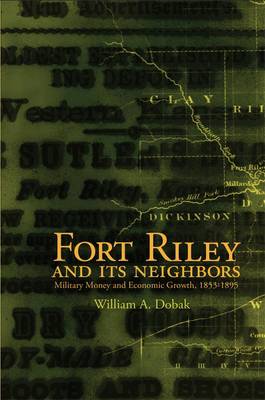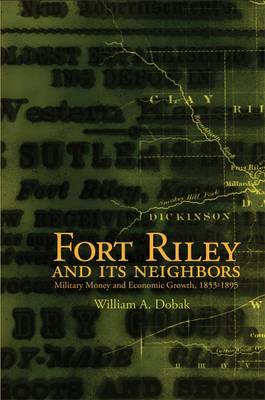
- Afhalen na 1 uur in een winkel met voorraad
- Gratis thuislevering in België vanaf € 30
- Ruim aanbod met 7 miljoen producten
- Afhalen na 1 uur in een winkel met voorraad
- Gratis thuislevering in België vanaf € 30
- Ruim aanbod met 7 miljoen producten
Zoeken
Fort Riley and Its Neighbors
Military Money and Economic Growth, 1853-1895
William A Dobak
Paperback | Engels
€ 26,45
+ 52 punten
Omschrijving
FORT RILEY AND ITS NEIGHBORS is a story of soldiers trying to save money and civilians trying to make it. Fort Riley stands today overlooking the Kansas River because army quartermasters in the 1850s thought that small steamboats could deliver supplies cheaply there. Civilians came to help build the fort and stayed to bid on the quartermaster's contracts for feed and fuel. Townspeople kept a covetous eye on Fort Riley's land and its resources, and they voted bond issues to build short-line railroads in order to get competitive freight rates from transcontinental carriers. The history of Fort Riley and its neighbors typifies the relations that evolved between the American people and their government throughout the American West. The settlers' approach to federal authority, at once supplicating and conniving, has persisted and thrived and become the national attitude.
Specificaties
Betrokkenen
- Auteur(s):
- Uitgeverij:
Inhoud
- Aantal bladzijden:
- 264
- Taal:
- Engels
Eigenschappen
- Productcode (EAN):
- 9780806139081
- Verschijningsdatum:
- 5/01/1998
- Uitvoering:
- Paperback
- Formaat:
- Trade paperback (VS)
- Afmetingen:
- 152 mm x 229 mm
- Gewicht:
- 385 g

Alleen bij Standaard Boekhandel
+ 52 punten op je klantenkaart van Standaard Boekhandel
Beoordelingen
We publiceren alleen reviews die voldoen aan de voorwaarden voor reviews. Bekijk onze voorwaarden voor reviews.











